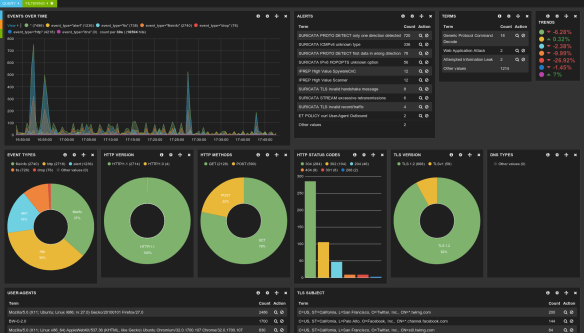 When processing the TCP 3 way handshake (3whs), Suricata’s TCP stream engine will closely follow the setup of a TCP connection to make sure the rest of the session can be tracked and reassembled properly. Retransmissions of SYN/ACKs are silently accepted, unless they are different somehow. If the SEQ or ACK values are different they are considered wrong and events are set. The stream events rules will match on this.
When processing the TCP 3 way handshake (3whs), Suricata’s TCP stream engine will closely follow the setup of a TCP connection to make sure the rest of the session can be tracked and reassembled properly. Retransmissions of SYN/ACKs are silently accepted, unless they are different somehow. If the SEQ or ACK values are different they are considered wrong and events are set. The stream events rules will match on this.
I ran into some cases where not the initial SYN/ACK was used by the client, but instead a later one. Suricata however, had accepted the initial SYN/ACK. The result was that every packet from that point was rejected by the stream engine. A 67 packet pcap resulting in 64 stream events.
If people have the stream events enabled _and_ pay attention to them, a noisy session like this should certainly get their attention. However, many people disable the stream events, or choose to ignore them, so a better solution is necessary.
Analysis
In this case the curious thing is that the extra SYN/ACK(s) have different properties: the sequence number is different. As the SYN/ACKs sequence number is used as “initial sequence number” (ISN) in the “to client” direction, it’s crucial to track it correctly. Failing to do so, Suricata will loose track of the stream, causing reassembly to fail. This could lead to missed alerts.
Whats happening on the wire:
TCP SSN 1:
-> SYN: SEQ 10
<- SYN/ACK 1: ACK 11, SEQ 100
<- SYN/ACK 2: ACK 11, SEQ 1000
-> ACK: SEQ 11, ACK 101
TCP SSN 2:
-> SYN: SEQ 10
<- SYN/ACK 1: ACK 11, SEQ 100
<- SYN/ACK 2: ACK 11, SEQ 1000
-> ACK: SEQ 11, ACK 1001
It’s clear that in SSN 1 the client ACKs the first SYN/ACK while in SSN 2 the 2nd SYN/ACK is ACK’d. It’s likely that the first SYN/ACK was lost before it reached the client. Suricata accepts the first though, and rejects any others that are not the same.
Solution
The solution I’ve been working on is to delay judgement on the extra SYN/ACKs until Suricata sees the ACK that completes the 3whs. At that point Suricata knows what the client accepted, and which SYN/ACKs were either ignored, or never received.
Logic in pseudo code:
Normal SYN/ACK coming in:
UpdateState(p);
ssn->state = TCP_SYN_RECV;
Extra SYN/ACK packets:
if (p != ssn) {
QueueState(p);
On receiving the ACK that completes the 3whs:
if (ssn->queue_len) {
q = QueueFindState(p);
if (q)
UpdateState(q);
}
UpdateState(p);
ssn->state = TCP_ESTABLISHED;
So when receiving the ACK, Suricata first searches for the proper SYN/ACK on the list. If it’s not found, the ACK will be processed normally, which means it’s checked against the original SYN/ACK. If Suricata did have a queued state, it will first apply it to the SSN. Then the ACK will be processed normally, so that is can complete the 3whs and move the state to ESTABLISHED.
Limitations
Queuing these states takes some memory, and for this reason there is a limit to the number each SSN will accept. This is configurable through a new stream option:
stream:
max-synack-queued: 5
It defaults to 5. I’ve seen a few (valid) hits against a few terrabytes of traffic, so I think the default is reasonably safe. An event is being set if the limit is exceeded. It can be matched using a stream-event rule:
alert tcp any any -> any any (msg:"SURICATA STREAM 3way handshake \
excessive different SYN/ACKs"; stream-event:3whs_synack_flood; \
sid:2210055; rev:1;)
Performance
This functionality doesn’t affect the regular “fast path” except for a small check to see if we have queued states. However, if the queue list is being used Suricata enters a slow path. Currently this involves an memory allocation per stored queue. It may be interesting to consider using pools here, although a single global pool might be ineffecient. In such a case a lock would have to be used and this might lead to contention, especially in a case where Suricata would be flooded. Per thread pools (519, 520, 521) may be best here.
IPS mode
SYN/ACKs that exceed the limit are dropped if stream.inline is enabled as is the case with all packets that are considered to be bad in some way.
Code
The code is now part of the git master through commit 4c6463f3784f533a07679589dab713096137a439. Feedback welcome through our oisf-devel list.





 When processing the TCP 3 way handshake (3whs), Suricata’s TCP stream engine will closely follow the setup of a TCP connection to make sure the rest of the session can be tracked and reassembled properly. Retransmissions of SYN/ACKs are silently accepted, unless they are different somehow. If the SEQ or ACK values are different they are considered wrong and events are set. The stream events rules will match on this.
When processing the TCP 3 way handshake (3whs), Suricata’s TCP stream engine will closely follow the setup of a TCP connection to make sure the rest of the session can be tracked and reassembled properly. Retransmissions of SYN/ACKs are silently accepted, unless they are different somehow. If the SEQ or ACK values are different they are considered wrong and events are set. The stream events rules will match on this. We just released
We just released
You must be logged in to post a comment.